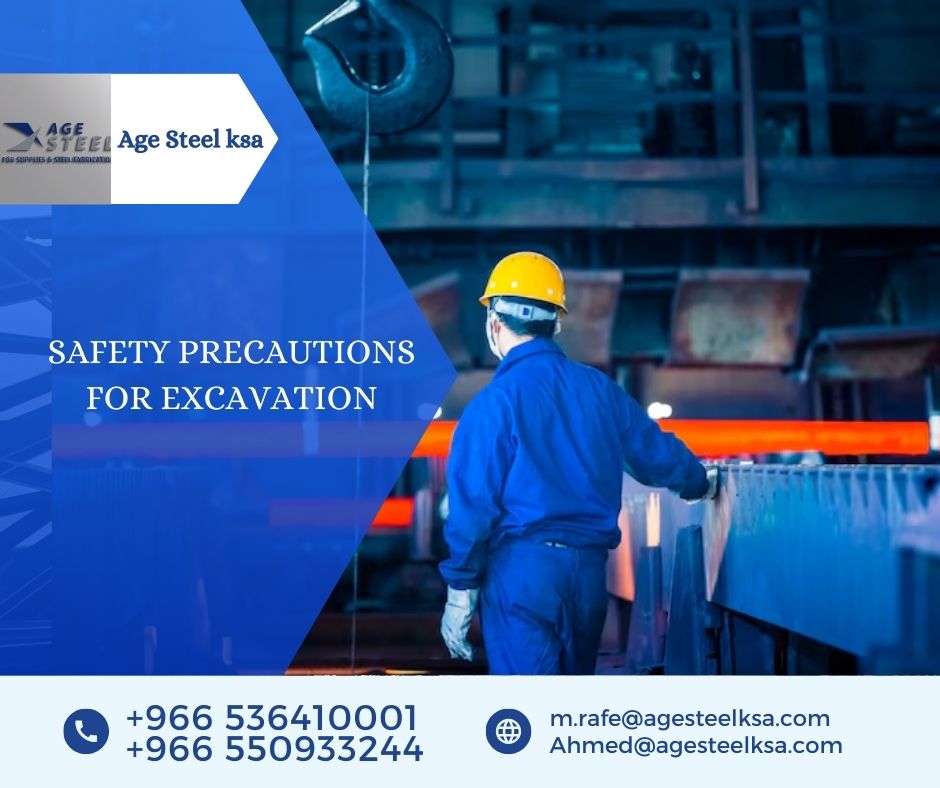
Excavation work is one of the most common yet hazardous activities in the construction industry. Due to the high risks involved, it is critical to follow strict safety precautions for excavation to protect workers, equipment, and the overall worksite. Ignoring these precautions can lead to severe accidents such as cave-ins, equipment falls, and exposure to hazardous conditions. This article highlights the essential safety precautions for excavation that every construction project must implement to ensure a safe and efficient operation.
Excavation involves digging, trenching, and earth-moving activities that expose workers to dangers like soil collapse, falling debris, and underground utilities. The Occupational Safety and Health Administration (OSHA) reports numerous injuries and fatalities linked to excavation work, often due to neglecting fundamental safety precautions for excavation.
This is particularly important in large-scale projects such as the construction of a steel structure building, where the integrity of the foundation must be guaranteed before the installation of steel frames. Moreover, working alongside structural steel fabricators in KSA requires adherence to safety measures to protect all involved personnel.
One of the primary safety precautions for excavation is to carry out a detailed site assessment before any digging begins. This includes:
It’s also important to communicate with suppliers to ensure that no pipelines or pressurized systems will be damaged during excavation, which can cause dangerous leaks or explosions.
Proper site assessment helps in planning the excavation method and the necessary safety measures to prevent accidents.
The biggest risk during excavation is the collapse of the trench walls or excavation sides. To address this, several safety precautions for excavation must be implemented:
Employing these protective systems reduces the chance of soil collapse and protects workers from being trapped, especially in projects involving steel fabrication in Saudi Arabia where trenches might be deep to accommodate foundation works.

Another critical safety precaution for excavation is providing comprehensive training for all personnel involved in excavation work. Training should cover:
Well-trained workers are more aware of dangers and more capable of maintaining a safe working environment. This is crucial, especially when multiple subcontractors may be working simultaneously.
Every worker on an excavation site should wear appropriate PPE as part of the safety precautions for excavation. This includes:
Failure to use PPE properly increases the risk of injury and can complicate rescue efforts.
Monitoring is a vital safety precaution for excavation to detect any changes in site conditions that could pose a risk. This involves:
Continuous monitoring allows for quick responses to hazards before they result in accidents.
Effective communication is essential among the excavation team to maintain safety. As part of the safety precautions for excavation, ensure that:
Clear communication helps prevent accidents and speeds up emergency responses.
Limiting access to excavation areas is an important safety precaution for excavation. Unauthorized personnel can increase the risk of accidents by being unaware of site hazards. To control access:
Access control keeps the site secure and reduces unnecessary risks.
Age Steel® is one of the leading steel suppliers in the region, known for providing high-quality structural steel, carbon steel pipes, and custom steel fabrication in Saudi Arabia. Their products are widely used in construction projects across the Gulf, including critical excavation and foundation work. Collaborating with reliable suppliers like Age Steel® ensures that all steel materials used in excavation support systems—such as trench boxes, steel plates, and shoring frames—meet the highest safety and durability standards.
Working with trusted partners like Age Steel® helps contractors implement essential safety precautions for excavation, ensuring that materials used on-site can withstand ground pressure and environmental stress. Their consistent supply of compliant and tested steel components—alongside coordination with industry leaders—contributes significantly to preventing structural failures and ensuring worker safety on excavation sites.
Implementing safety precautions for excavation is essential to protect workers and ensure project success. From thorough site assessments and protective systems to worker training, PPE usage, and emergency planning, these measures create a safe working environment. Always prioritize safety and never overlook the importance of strict adherence to excavation safety protocols.
